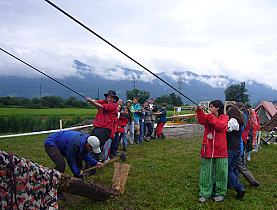
Celebrating Switzerland, California style

As in many places around the world, for Swiss-Americans and expatriates in Los Angeles, celebrating the national holiday is a time to relive old traditions.
The Swiss community here meets each year on a Sunday close to August 1 for the Swiss Fair at the Swiss Park in Whittier, a suburb in the eastern part of the greater Los Angeles area.
“It is a wonderful opportunity to meet with friends and acquaintances,” one elderly lady told swissinfo at this year’s celebration, referring to the broadly scattered Swiss community.
“This is where the French-language Swiss, the German and the Italian-speaking compatriots and even the Romansh meet,” says another woman from Geneva, explaining what the day means to her.
“It is a big family event. Once a year, the different generations come together here, and also the youth, for whom the Swiss clubs are not as important as they were for my generation,” said the president of the Swiss Park, Max Bachmann, a 40-year resident of California.
Technology has made contact much easier to keep in touch with Switzerland, and many second and third generation Swiss nationals have partners without Swiss roots. The community abroad – like back home in Switzerland – has become ethnically diverse.
Sausages, sauerkraut and raclette
The gates of the Swiss Park open in the late morning. In the background, music plays and one can hear both Swiss-German and American English. Soon, the smell of sausages, sauerkraut and raclette will permeate the air. Potato salad and Knöpfli – a type of fresh pasta literally translated as “little buttons” – are also on offer but to the disappointment of many, will be sold out by early afternoon.
As time passes, more and more people fill this park, creating a sea of red and white T-shirts. Those not wearing the national colours can easily buy something at one of the stands.
Also for sale, are homemade Swiss baked goods, honey, the legendary Bratwurst and Landjäger sausage, bacon, cheese and some more peculiar Swiss culinary classics like Maggi flavouring, the bright yellow Aromat seasoning and Thomy mustard.
Meanwhile, a band of accordion-playing friends from Santa Barbara makes way for three men and two women, who are playing an acoustic set. The audience applauds.
Later, alphorn players are joined by three women, each of whom spinning a coin around a porcelain bowl. It is a tradition known as “Taler schwingen” that originates from the Appenzell region in eastern Switzerland.
Accompanying them is the Swiss Harmony choir and an 89-year-old accordion player named Tony Hartenstein. The audience joins in, singing.
On the lawn behind the marquee families have ensconced themselves in the grass, their children passing the time playing, while others practise their crossbow skills in the shooting gallery.
Between musical performances, the Swiss consular general for Los Angeles, Brigitta Schoch Dettweiler, delivers a short address, followed by the singing of the two national anthems.
Her speech centres on ecological issues, and Dettweiler refers to the efforts and successes of Switzerland in this field. Finding solutions for environmental problems is in the interest of future generations, she tells the audience.
Costumes and “Sennenkäppi”
Scores of Swiss in the region have been living here for decades and are dual citizens; for some, their children are grown up and have had their own children. For many, Switzerland remains important even today.
They say they are patriotic, proud of their roots and not afraid to show it. Many are dressed not only in red and white, but in old-fashioned Swiss costumes or wearing traditional round herdsmen’s caps called “Sennenkäppi”.
Quite a few travel to Switzerland regularly. While some flock to the Alps, others prefer Lake Constance or Lake Geneva. Nevertheless, they have noticed some negative trends in the homeland.
“Yes, more graffiti,” some say. “More rubbish in the streets than earlier.”
As the sun disappears behind the horizon, the Swiss Park begins to empty. Bachmann, the park’s president, has a positive impression of the day. Lilo Holzer, the day’s chief organiser, and her helpers are all calling the event a success.
Holzer is exhausted but satisfied. “I am happy that we had 1,500 adults and so many children with them,” she says. Her fears that high petrol prices would discourage visitors from making the trip to Whittier did not materialise.
Nevertheless, the long day is still not finished. It is now time to clean up.
swissinfo, based on an article in German by Rita Emch in Whittier, California
There are a number of Swiss clubs in the Los Angeles region.
They include the United Swiss Societies of Southern California, the Swiss Singing Society Harmonie and the Colonie Suisse Romande.
The Swiss Park in Whittier belongs to these clubs.
After running up big deficits, the Swiss Park now provides catering and banquet services and is popular for weddings.
Its financial woes have been in recent years virtually eliminated says park president Bachmann.
The park is normally operated by an Austrian couple, which returns a percentage of the revenues to the owners.
There are an estimated 1.2 million people in the US with Swiss roots.
Most are found in California, New York, Ohio, Wisconsin and Pennsylvania.
Almost 74,000 Swiss nationals were registered in the US in 2007. Around 52,000 had dual nationality.
In Los Angeles, there are 13,200 registered Swiss.

In compliance with the JTI standards
More: SWI swissinfo.ch certified by the Journalism Trust Initiative







































You can find an overview of ongoing debates with our journalists here . Please join us!
If you want to start a conversation about a topic raised in this article or want to report factual errors, email us at english@swissinfo.ch.